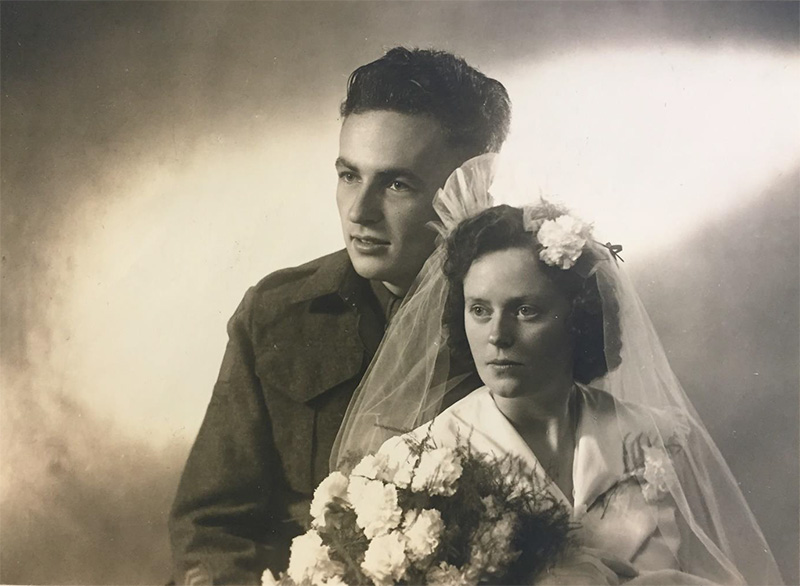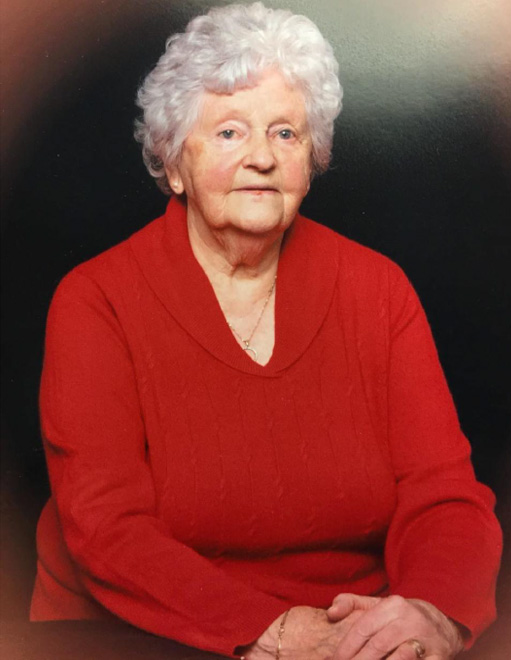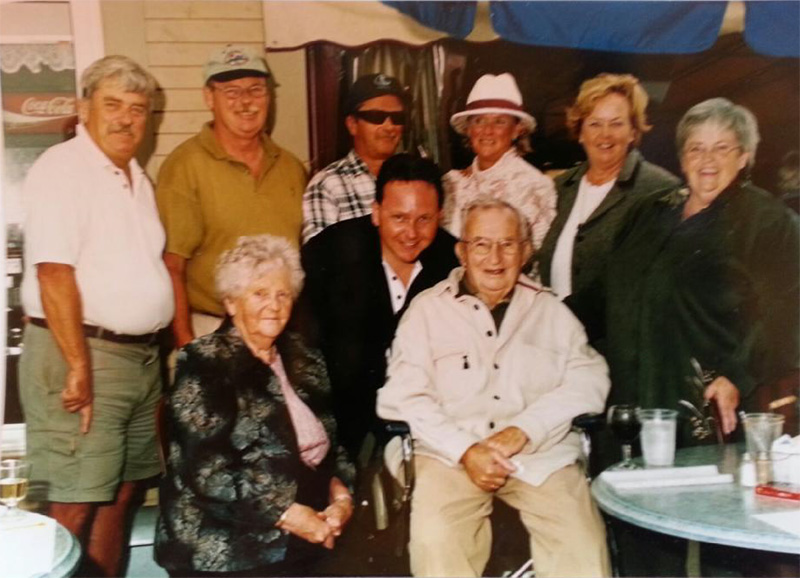Wall of Service
Column
23
Row
30
My Journey to Canada
by Helena Lengacher, April 2016
I was born September 6, 1920, in Waterland-Oudeman situated in Oost-Vlanderan, Belgium to the proud parents of Rene Heyneman and Celina De Meyer. Not long after, at age three, my parents once again gave thanks to the arrival of a son, Arsene Heyneman, my one and only sibling I would ever have.
Although I did not necessarily realize it growing up, I had a very privileged life and remembered having servants to take care of all the daily household tasks. At age 11, my father sold the farm and built a house right in the heart of Waterland-Ouderman. My father was the Mayor of the town and owned the local brewery which supplied beer to all the neighbouring restaurants and establishments. At the time, we were one of the few families to have a motor vehicle and I actually learned to drive one of my father’s trucks in the delivery of beer.
At age 19, my world forever changed and despite Belgium being neutral at the start of World War II, German forces invaded my country on May 10, 1940. In just 18 days of fierce fighting, the Belgium military was pushed back into a small pocket in the North-East of the country and surrendered to the Germans. We were now a country under occupation which we would endure for the next four years.
As mayor and a very influential business man in the region, my father was regarded as a strategic asset to the German High Command. The Germans wasted no time in taking over our home and my father’s business, and to ensure we would all cooperate, my brother Arsene was taken along with many other young men in the town and sent to a Nazi concentration camps. Unlike many other girls my age who were abused, imprisoned or killed by the German’s, I was spared my life only because I knew multiple languages, making me the local translator.
It seemed as though the bombing would never end, and even at one point my mother fled our home in search of higher ground with most of the rest of the townsfolk because we were all convinced the German’s were going to break the dykes and flood our town. Despite the horrific atrocities against human life, my father never left the town and I stood alongside him thinking that one day we would perish together.
It was hard to know at any given time if it was the German’s dropping bombs on us to keep the locals in-line or ally troops dropping bombs on the German’s who had invaded us, but either way simple survival became the new normal. One time I was running because I could hear the whistle of bombs coming and one exploded a short distance in front of me killing others, but yet I got away without a scratch. I remember thinking to myself, why me, why am I to live when others would die?
By early September 1944 the fighting seemed to escalate to a level not yet reached and both my father and I knew that the ally forces were desperately trying to gain back our country that seemed to be forever lost to our German occupiers. Given that our home housed the local German Command, we quickly realized we now stood on the frontline between good and evil. Sensing that the allies were going to break through, the German’s did exactly what we had all feared so many times before, they broke the dykes. I recall my father and I laid on shelves in a bombed out basement as we stayed clear of the retreating German army. As the water rose in the basement, I said to my father this is where we will now die, father and daughter.
Just as I had given up all hope of ever surviving, we heard soldiers approaching and then the cellar door swung open and a voice called down, in what I now know to be English, asking "is there anyone down there?" A minute passed and then the voice blurted out the same question, but this time in German. I whispered to my father, "do not say anything, it’s the German’s, they have come back to kill us!" Both my father and I laid motionless as a soldier walked down the basement stairs, wading through the water, and coming to where we were on the shelves. The soldier said he was with the Canadian military and had come to save us. I scoffed and told my father in Flemish not to say anything because this was a German spy and he was simply going to kill us. Needless to say, despite my initial protests, the young soldier turned out to be Canadian and he, along with many other soldiers, did in fact come to liberate us.
Now our fate seemed to take a turn for the better. My father welcomed the Canadian soldiers into our home with the Canadians quickly converting our chicken barn into a make-shift kitchen to feed both us and their troops. For several days we were still on the frontline of fighting with ally forces lining-up tanks all across our property firing at the retreating German forces; but things were different. We now felt that we just might actually live. My brother Arsene, was found and returned back to the family but he was very sick, emaciated and although he never completely recovered, we were grateful that he was at least one of the lucky ones who survived his internment.
Amidst all of the action, the young soldier that so bravely rescued my father and me, wanted to chat with me. Beyond some brief, awkward and otherwise strained conversation, I really did not pay too much attention to him, and he was not one of the soldiers who actually stayed at our house. As the days passed the Canadian troops moved further and further away from our home, but that one Canadian soldier kept coming back every time he had a days-furlough, first in a “borrowed” jeep, and then at times on a “borrowed” motorcycle.
My father would tell me to be nice to the young man, I mean this was the guy who saved us, so out of respect I entertained this Canadian soldier, named Fred Lengacher. Over the course of several months Fred visited often and the conversations became friendlier and each time it would end with Fred telling me, "I will be back". One point Fred said to me, "I am going to marry you", and I would respond back to him, "yes of course", in a sarcastic voice. Now do not get me wrong, this Fred guy was entertaining but I did not think he was serious about anything and I said to my father each time he left to go back to the front line, he will probably be killed. Over the course of a year he would keep coming back and the conversations always ended with him saying "I am going to marry you."
One day, Fred came to visit, papers in-hand from the Canadian forces, and asked my father if he would sign saying that he could marry me. My father in almost a whimsical voice said yes, and then turned to me and said, "So is this good with you Helena?", and I remembered saying back to my father "ah sure". Now both my father and I took Fred’s proposal very lightly because the reality was that Fred, after being part of the liberation of Belgium, had to go on to Holland and then into Germany.
More amusing was my father’s request that Fred, who was of Anglican faith, would he be willing to convert to Catholicism, to which my father said, that he would get our local priest. So my father arranged a meeting between the catholic priest, my father and of course myself. It was at this meeting the priest refused to give permission for this Anglican to be converted or for me to marry him because he was not Catholic. I remember the conversation got more and more heated between my father and the priest until finally my father took the priest by the neck and physically threw him out of our house. As the bewildered priest was ejected from the house my father said to him, "if my daughter wants to marry this man, she will marry this man, with or without the catholic church". After everything that we had endured in the war, now the stigma of being the Mayors daughter who was thrown out of the Catholic Church – I quickly became the black sheep of the town.
One day a notice arrived from the Canadian Army advising my parents and me that I was to be married in the city of Gent on September 5, 1945. I remember my father’s best friend driving me in his fancy car, but my mother refused to come to the church because she did not agree with me being married to an Anglican in an Anglican church; but my father was there and stood proudly. I remember arriving at the church and there were throngs of Canadian soldiers and local people who wanted to see the daughter of a Mayor from a neighbouring town, marrying the Secretary to General Montgomery. Yes, that’s right. Fred made sure that a rumor got spread saying that he was General Montgomery’s right hand-man, even though Montgomery was British not Canadian.
After the wedding ceremony, we returned back to Waterland-Oudeman to a huge banquet that my mother had the servants prepare. All of my cousins came, even those from Holland, but not my aunts because none of them agreed with my marrying as an Anglican. Immediately following the reception Fred was back off to war with his fellow soldiers as they pressed into the heart of Germany. It was several months before I would physically see Fred again, although I received many letters from him while we were apart.
At Easter of 1946, Fred had to leave with the military to go back to Canada and it would be several more months before arrangements by the Canadian Government were made for my departure to a new country, but the day finally came in August of 1946. When I got my notice my father, who I had been through so much with, said to me "when you leave I will never see you again". He told me that he would never take a boat or fly and whether I liked it or not, this was what it was going to be. Likewise, the day I left, August 26, 1946, my mother was overcome with sadness, weeping uncontrollably and locking herself in her room. I found out many years later, that my mother closed the drapes and did not come out to see anyone for days after my departure.
Arsene drove me to the harbour in Antwerp Belgium and it was there I boarded the Lady Rodney to go to England. Under normal circumstances this leg of the trip would take just a few hours but the waterways were still riddled with unexploded mines the Germans’ had placed there during the war, so it was not until the morning of August 29th that our ship finally docked in South-Hampton England. Just a few hours later that day I was on the Aquitania and as the sun set, I was on my way to Canada.
The trip to Canada was filled with moments of uncertainty, and new discovery. I remember crew-hands giving us oranges, something many of us had never seen before and not knowing what to do with them. I also received small pamphlets to read which described how life would be in Canada, but they were all in English, so it really meant nothing to me. In spite of not understanding the language, the trip was very pleasant, we all had plenty of food, too much food, and warm comfortable living quarters. During the voyage I realized I had left everything I had ever known, all the people who I had ever loved, or had loved me, and was steaming to somewhere I knew nothing about.
September 4, 1946 the Aquitania slipped into the harbour at Halifax, where once again the process of sorting out who was who, who was going where and how you were going to get there, was handled like a well-organized bee hive. The next day, Thursday, September 5th I was escorted with many other war brides from many other countries onto a train heading West across Canada, with one of the first stops being in the province of Quebec. On the train, there were several trainmen who took care of each individual, ensuring they would get to the right place and be met by the people that were supposed to meet them. I was travelling on the train for about 21 hours until a trainman told me that my stop in Foster Quebec was fast approaching. It was too funny when I got off the train on September 6th, there was Fred along with his parents, my new in-laws, Alfred and Anna and for whatever reason Fred was so nervous he could not even talk. My father-in-law said to Fred, "what’s wrong with you aren’t you going to kiss your wife?" After the initial awkward greeting, we all drove back to my in-laws’ farm in Sutton, my new home with my husband, and they held a big birthday party celebration in my honor.
I will say that life on the farm was hard, the many chores and obligations like gardening, raising, livestock, piling wood, cooking and cleaning to name just a few. There were many days I would cry my way through the whole day wondering what have I done. As time went on I adjusted to my new life and on September 20, 1947 I gave birth to my beautiful baby boy, James. Then two years later in the spring of 1949 I was pregnant with our second child, as Fred, our baby boy James and I, moved to our new house in the village of Sutton.
Many things have happened in my life since my humble beginnings in Canada; I am the proud mother of 7 children, 22 grandchildren and 19 great grandchildren. Life has been good to me in my adopted country and I have a very long list of things that I am grateful for. At age 95, I still live in the same home, on my own, that Fred built for us back in 1949.
My beloved Husband, father of my children and Sergeant in Canadian military who helped to liberate my birth country from one of the greatest evils in modern times, passed away at age 80 on April 18, 2005. And although I miss Fred, the family that we raised together are never far away. Together, we live, love and continue to grow our family because I dared to come to a new country, Canada, The True North strong and free.



(Back) James, David, Larry, Celina, Laura, Christine
(Front) Helena, Stephan (Steph), Fred